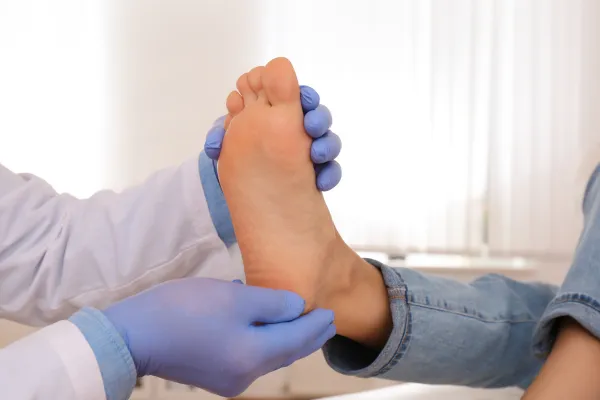Tips & Advice From Foot & Ankle Associates of Southern NH

Posterior Tibial Tendon Dysfunction: The Silent Arch Killer
When we think about foot pain or arch problems, we often picture flat feet or plantar fasciitis. But one of the most overlooked—and potentially serious—conditions is Posterior Tibial Tendon Dysfunction (PTTD). Often called the “silent arch killer,” PTTD can sneak up on you, gradually flattening your foot and affecting everything from your gait to your knees and back.
At Foot & Ankle Associates of Southern NH, we see many patients who come in too late—after their arches have already collapsed. The good news? If caught early, PTTD is highly treatable.
What Is Posterior Tibial Tendon Dysfunction?
The posterior tibial tendon is a key structure that supports the arch of your foot and helps you walk. It connects the calf muscle to bones in the foot and plays a crucial role in stabilizing your step.
In PTTD, this tendon becomes inflamed, overstretched, or torn—leading to a progressive collapse of the arch. This condition can result in flatfoot deformity, chronic pain, and difficulty walking if left untreated.
What Causes PTTD?
PTTD often develops over time, especially in:
Adults over age 40
Women more than men
People who are overweight or have high-impact lifestyles
Individuals with flat feet or poor biomechanics
Athletes or those with repetitive stress on the foot (e.g., long-distance walking or running)
Sometimes the onset is sudden—after an ankle injury or fall—but most cases develop slowly, making it harder to catch early.
Early Warning Signs to Watch For
Recognizing PTTD early is key to preserving foot function. Watch for these symptoms:
✅ Pain or swelling along the inside of the ankle or foot
✅ Flattening of the arch, sometimes just in one foot
✅ Trouble standing on your toes
✅ Rolling in of the ankle (overpronation)
✅ Fatigue or aching after long periods of standing or walking
✅ Difficulty fitting into shoes due to foot shape changes
If you're experiencing any of these symptoms, don’t wait—it’s much easier to manage PTTD in its early stages than to correct a collapsed arch later on.
Why Early Treatment Matters
Left untreated, PTTD can lead to rigid flatfoot, arthritis in the foot and ankle joints, and chronic pain. Patients may eventually need reconstructive surgery or even joint fusion if the condition becomes severe.
Early treatment can prevent long-term damage and often avoids the need for surgery. Interventions may include:
Custom orthotics or braces to support the arch
Physical therapy to strengthen surrounding muscles
Anti-inflammatory treatments to reduce pain and swelling
Activity modification to reduce tendon strain
Shoe recommendations that provide adequate arch and heel support
In more advanced cases, surgical intervention may be required to repair or reconstruct the tendon and restore proper alignment.
Real Care for Real Results
At Foot & Ankle Associates of Southern NH, we specialize in identifying early-stage foot conditions and offering personalized treatment plans. If you're noticing changes in your arch, balance, or comfort when walking, don’t ignore it.
PTTD may be silent—but it doesn’t have to be permanent.
Schedule an Evaluation Today
If you suspect you may be experiencing Posterior Tibial Tendon Dysfunction, early action is your best defense. Book an appointment with our team and let’s protect your arches before it's too late.
Ask Foot & Ankle Associates of Southern NH And Their Team
Fill in the form to request a call from our team. One of our team members will call you for FREE and answer any questions or concerns you may have about your condition
Where To Find Foot & Ankle Associates of Southern NH

If you have any questions before scheduling an appointment or for general inquiries, please use the contact us button below. Our team will promptly reach out to assist you.
Opening Hours
Monday: 8:00am – 5:00pm
Tuesday: 8:00am – 5:00pm
Wednesday: 8:00am – 2:00pm
Thursday: 8:00am – 5:00pm
Friday: 8:00am – 2:00pm
Saturday: Closed
Sunday: Closed

